Kailash Ranganathan
My Kodaganallur trip was truly a memorable experience for so many reasons. Most notable was that the trip afforded me a unique intellectual and cultural collaboration in a small village 8000 miles away from home, all under a wrapper of extraordinary hospitality. I will cherish this experience forever.
At the outset, I realized how rusty my Tamil was. It was humbling for me to see how brilliant and clever the Kodaganallur High Schoolers were, sometimes constrained to manifest these unique characteristics in a meaningful manner due to the rigidity of the school systems and extremely constraining socio-economic conditions. Of course, the disparity of education between my private schooling and the pedagogy presented to the Kodaganallur high schoolers showed me clearly how fortunate I was to receive a broader education in the US. Thus, during my visit, I did my best to bring the best parts of my education and what it has taught me through robotics, programming, and math, to Kodaganallur, with invaluable lessons and realizations along the way.
My trip effectively had three components:
• working with the high schoolers in the NSS (National Student Services),
• teaching various topics in engineering, robotics, math, and science to the
high schoolers and lower school children initially
• participating in the YOKE running camp with a few very talented local
runners.
My first two sessions were with the lower schoolers, where we did the basics of how to power on a lightbulb with wires as well as math puzzles and tricks that they may not necessarily find in school. We did two sessions in total, so the experience was quite limited but gave me a good idea of what was feasible and what was not. Unfortunately, the Raspberry robotics kits I had brought were not very conducive to the environment I taught in, as some mechanisms only work with a strong WiFi connection, but this was not an issue as I had plenty of other options to do.
With the high schoolers, our initial session was with electronics. I used the same Raspberry Pi kits I had brought with me at the previous session. With those, we did basic series and parallel circuits with LEDs, and by the end, there were some groups who were able to add many more LEDs in a row and have them all light up through complex circuitry; with no prior experience with these types of circuits, it was fascinating to see the complexity of the arrays the High Schoolers built with minimal guidance. This was meant to be a precursor to eventually designing a robot. However, the wheel motors were failing and I could not get them to power, so I had to eventually make a change of plans.
In the next few days, we worked on basic C++ syntax, and I realized that their school book was not explaining programming concepts in a way that was clear. In C++, we ran example programs and did a few activities with variables to develop a conceptual understanding of programming (how can you change the numbers stored in a variable, what do functions do, etc). In that same session, I was able to teach them about binary and how to change numbers from “decimal” to binary and other bases. We then connected this back to the initial day and saw how each “0” and “1” in binary could be represented as the LED on or LED off. I did a couple of demonstrations with the sensors I had initially brought for the robot; these included infrared distance sensors as well as a temperature sensor. One day, I created a set of logic puzzles and math problems of the type that would show up in some American math contests (these are called Olympiads), and everyone
grouped themselves into teams and tried to solve each of the problems as fast as possible. This was great to see, as they were not only enthusiastic and eager to participate but some of the teams were coming up with solutions extremely quickly and working at an extremely high level.
On the final day (as I thought a discussion-based session would be best after we’ve spent some time together), I introduced them to some of the pedagogy we have in the US Schools where the emphasis is on discussion and problem-solving. One specific competition I have participated in in the US is Future Problem Solvers, where we identify problems in a fictional society and devise solutions to help fix those problems. I thought this would be a good way for everyone to communicate what different issues they saw in their community/society as well as think through possible solutions for their main problem (for illustrations’ sake, the basic structure of the FPS competition is coming up with a wide range of issues, choosing the most “underlying” one out of them all, and formulating solutions for that underlying problem). Initially, I was somewhat hesitant regarding the feasibility of this idea, notwithstanding the language barrier but also whether they would be comfortable trying out such an activity. Of course, I was completely
wrong in thinking this, and they exceeded my expectations by far.
Not only did every group come up with a variety of prevalent issues, from rampant alcoholism to crime and poor working conditions for farmers, but eventually each group’s presentations turned into passionate debates and discussions about how solutions would be implemented, who would be harmed as a result of them, and occasionally if the solution was even effective. Everyone already had their own ideas and conceptions of the world they lived in, except the rigidity of their school system prevents any sort of discussion or liberty to espouse one’s own beliefs completely openly in a safe space. So naturally, once given the opportunity to do so, everyone would, as I witnessed on that day, unleash those latent thoughts and arguments, some groups coming up with clever and ambitious solutions. The discussion that the FPS activity facilitated was quite endearing, as everyone was passionately engaged and finally had a medium to voice their opinions. This also demonstrated to me that each one of them had the potential to change their communities’ flaws through intelligent means, yet they held back through socioeconomic limitations and unable to pursue their dreams. However, I hope that through the less than two weeks of interactions and exposure we had together, that they will be able to capitalize on their talents, smarts, and creativity to rise and change their world in whatever way possible.
Obviously, my experiences there were, by no means, one-way. I learned just as
much, if not more, from my days with them for their NSS project. We cleared areas for new plants, took out weeds, and in the final day, dug holes and planted various crops and grasses around the village. I also got to learn more about their lifestyle in the process. Many of them are very smart and have interests in STEM as I saw in the classroom sessions but are unable to carry out their ambitions due to preexisting socioeconomic conditions. Through this brief period of exchange in my time at Kodaganallur, they have motivated me to have fun in all parts of life and have the endurance to stay positive, and I hope I have inspired them to now realize that their schooling does not necessarily do justice to the intellectual capabilities that every one of them possesses.
Another point that I feel is significant was the unparalleled kindness and
hospitality I was welcomed with. Within the first day, all of them were so friendly and outgoing that I felt comfortable around them and had any nervousness or worry I may have started the trip with completely alleviated. This extends to everyone else too: other villagers, and especially the coaches and other members of the running camp. There was no hesitation, and everyone readily accepted me as another member of their groups and circles, a sense of friendliness almost impossible to find in Silicon Valley schools. Plus, everyone had a great sense of humor, and their playfulness always made me smile. For example, on the first day of the running camp, I was running with two other guys, and towards the end I heard one of them say to the other “Slow down now, we’ll catch him at the end and run past him” in Tamil, believing that I did not understand them. I couldn’t help but smile a little at this remark, and sure enough, the last stretch of the run was a heart-pounding sprint to the finish in which I was only barely able to come out in front after using all of my energy and then some more. Their hospitality and interest in taking care of each other, no matter how different we may be, is something that amazed me and something that I am extremely grateful for. Everyone went out of their way to ensure that I was comfortable and enjoying myself, even if they had only just met me. It’s not an understatement when I say that the friends I made in Kodaganallur are the nicest people whom I have had the pleasure of meeting, and I hope that we can stay as life-long friends. I have many of them on Whatsapp and have spoken to some of them a few times during quarantine. Due to school, the trip was much shorter than I would have liked, but as Dr. Seuss says, “Don’t cry because it’s over, smile because it happened.” The trip had a great impact on my life, and I hope that I have had even a fraction of that impact on everyone I have met.
When I return in the future, I’ll be sure to come with more experiences from my own life, more stories to share, and of course a better understanding of the Tamil language to share them with. Thank you to Chitra Aunty & YOKE Society for facilitating this wonderful experience, and to all the Kodaganallur High Schoolers, for forging everlasting memories with me, and to all the hospitable villagers who I am eternally thankful towards.
I truly cannot wait to return!


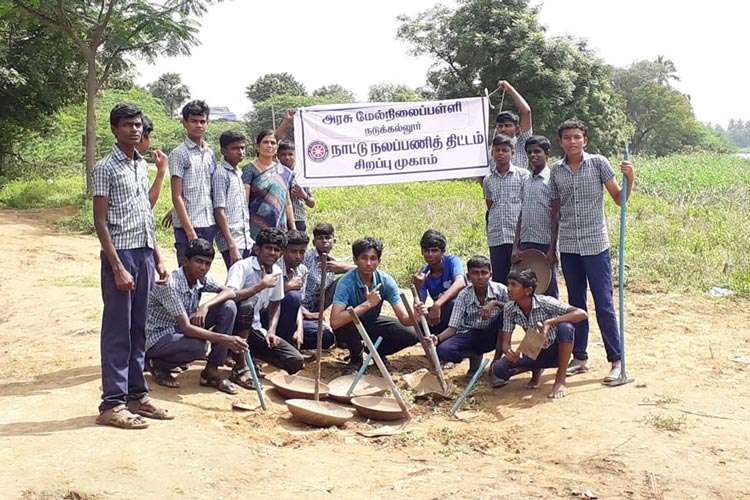
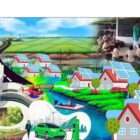
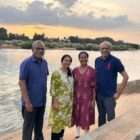
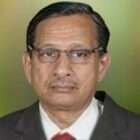
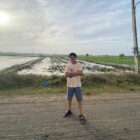
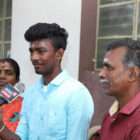
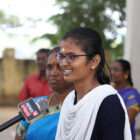

Andal Raghavan
May 7, 2021Excellent Presentation